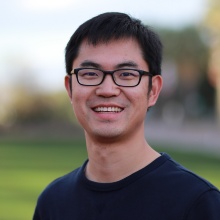We are pleased to announce that Bo Guo, an Assistant Professor in the Department of Hydrology and Atmospheric Sciences at the University of Arizona, Arizona (USA), will give the SFB 1313 "Pretty Porous Science Lecture" #56. His talk will be on "Fate and transport of PFAS in the vadose zone across scales: controlling processes, mathematical formulation, and practical modeling approaches".
Date: 11 July 2024
Time: 4:00- 5:00 pm CET
Speaker: Bo Guo, Assistant Professor in the Department of Hydrology and Atmospheric Sciences at the University of Arizona, Arizona, USA.
Lecture title: "Fate and transport of PFAS in the vadose zone across scales: controlling processes, mathematical formulation, and practical modeling approaches"
Place: Multi Media Lab (MML), U1.003, Pfaffenwaldring 61, 70569 Stuttgart, Campus Vaihingen.
Hybrid Access: https://unistuttgart.webex.com/unistuttgart/j.php?MTID=m2aeef916991bccc227a54e843cf92e08
Abstract
PFAS are emerging contaminants that have been widespread in the environment. A growing body of site investigations suggests that PFAS have accumulated significantly in soils at many contaminated sites, posing a long-term threat to contaminate the groundwater underneath. Understanding and quantifying PFAS leaching in soils and mass discharge to groundwater are therefore critical for characterizing, managing, and mitigating long-term groundwater contamination risks. Many PFAS are surfactants that adsorb at air–water and solid–water interfaces, which leads to complex retention of PFAS in soils. Concomitantly, PFAS present in pore water can modify surface tension and in turn impact variably saturated flow, which further complicates the fate and transport of PFAS in soils.
In this talk, I will give an overview of our recent work that aims to understand and quantify the primary processes that control the long-term leaching of PFAS. I will start by presenting a mathematical model that represents a set of PFAS-specific transport processes including concentration-dependent capillary pressure, and rate-limited and nonlinear adsorption at the air–water and solid–water interfaces. This will be followed by the discussion of additional complexities to test hypotheses formulated from field observations. Insights from these analyses allow us to develop simplified models with a focus on the primary processes that dominantly control PFAS leaching. The simplified models provide efficient and accurate screening-type tools for quantifying long-term PFAS leaching from soils to groundwater.
About Bo Guo
Dr. Bo Guo is an Assistant Professor in the Department of Hydrology and Atmospheric Sciences at the University of Arizona. His research group studies fluid flow and transport in permeable geological materials, motivated by environmental and energy problems including fate and transport of emergent contaminants in soil and groundwater, shale gas/oil production, and geological carbon storage. Bo holds a B.S. (with highest honor) in Hydraulic Engineering from Tsinghua University and a Ph.D. in Civil and Environmental Engineering from Princeton University. Prior to joining the University of Arizona, he did his postdoc in the Department of Energy Science and Engineering at Stanford University. Bo received NSF CAREER Award (2023) and Humboldt Research Fellowship for Experienced Researchers (2023).


